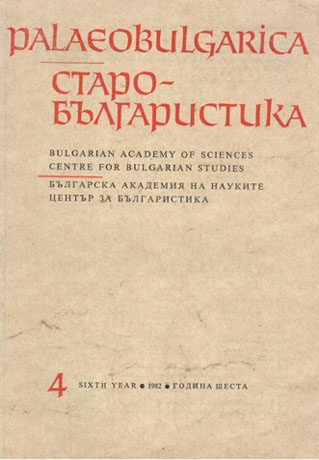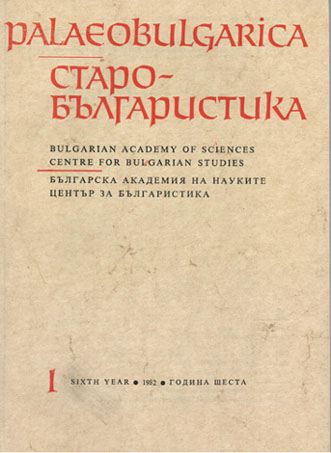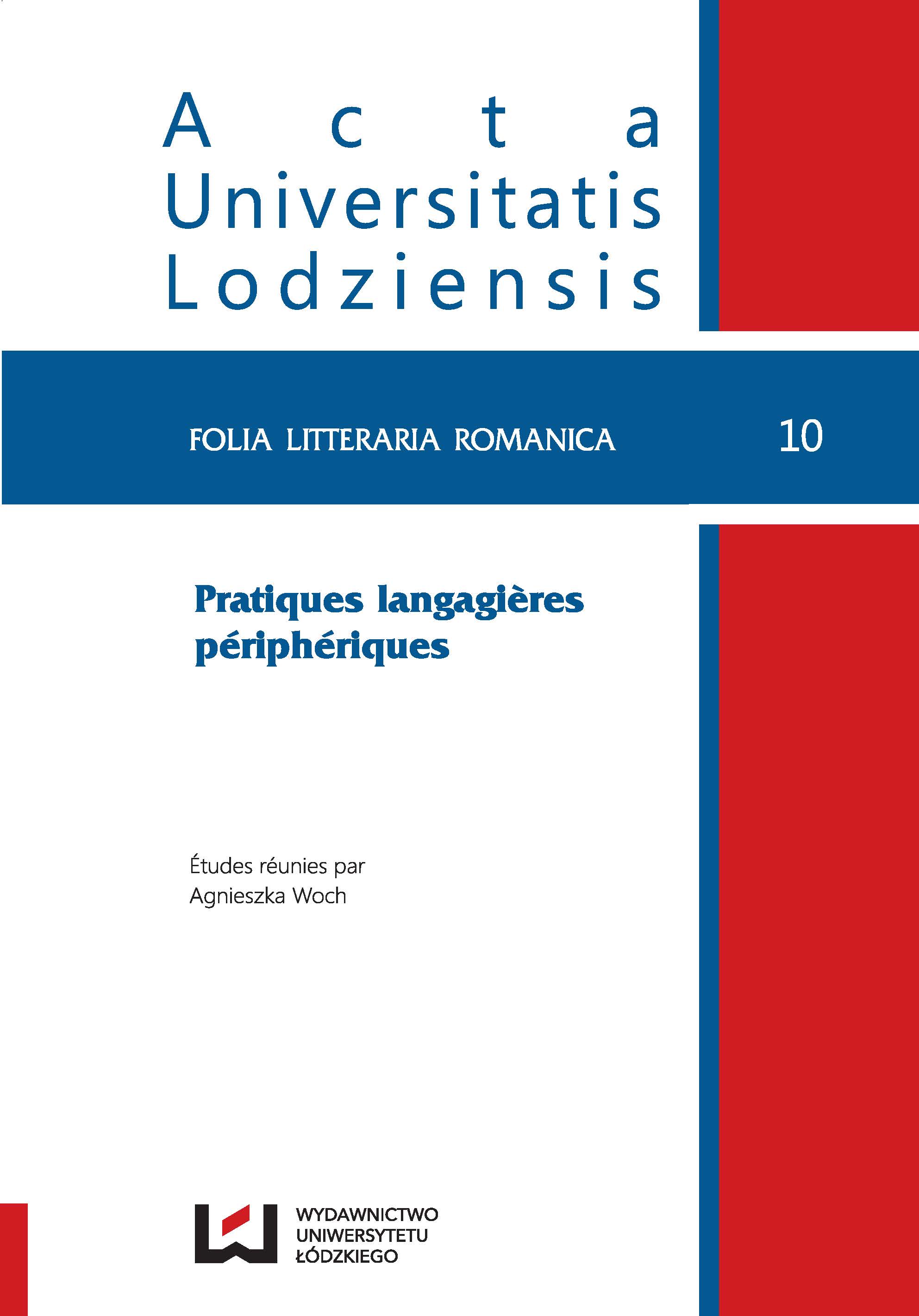
We kindly inform you that, as long as the subject affiliation of our 300.000+ articles is in progress, you might get unsufficient or no results on your third level or second level search. In this case, please broaden your search criteria.








There are few linguistic studies about the register of the French language spoken during the First World War, on the front and behind it. There are many written testimonies, but not all have been analysed and therefore it is for the linguistic researchers to dig out into this vast corpus and present their conclusions. Even if since then the linguists have indicated that there is such an argot of the poilus, it’s of outmost importance, from a methodological perspective, to update the neologisms of the 1914–1918 War in order to determine if the French soldiers on the front did speak such an argot.
More...
The difference between jargon, slang and specialized language often becomes blurred in the case of professional discourse. The reason is to be found in the very nature of this type of discourse, as well as in the socio-professional characteristics of its users. After carefully analyzing a significant body of oenological criticism written in Spanish by experts and wine-tasting enthusiasts, this article concludes that professional language may be regarded as a type of social dialect that functions as a badge of identity among its users. The use of such a social dialect thus aims to facilitate communication and strengthen bonds among experts and wine-tasting aficionados, while excluding those who are not in the know.
More...
The results of the field collection of professional argots are stated in the following paper. Farmers of Ardennes and Aisne departments who deal with cultivating grain-crops, breeding cattle and meat-processing took part in the linguistic experiment. The field records of the oral speech of professional groups were organized in different situations with the use of four methods: interviewing, participant observation, written questionnaires and the so-called method « from the initiated to the initiated ». The method of processing and the presentation of collected material are described and the analysis of the professional argots is given in this work.
More...
This article presents some results of research in multimedia translation especially in the field of French-German contrastive description of film-subtitles. Our analysis is based on original dialogues and scripts of some of most popular films about the life in French suburbs; the transcriptions will be compared with the subtitled versions in German and in any cases with the dubbing-text. We aim to study the use of expressive and affective idioms in the French dialogs and their translational solutions chosen by the translators. Are discussed the ritual use of phraseological units like swear-words/maledictions, idioms of invectiveness and offences, verbal slanders but also specially connotated interjections and forms/terms of address to clarify their significations and functions. Adequate translation of this type of expressions is very important for the respect of the “aim” of those films.
More...
In 2009 we celebrated the 20th anniversary of the proclamation of the Hungarian Republic born from the ashes of Communist Hungary. 1989, the year of the transition, brought major changes to both Hungarian slang research and publishing. Slang and slang research, considered unjustly responsible for the existence of social differences, were rejected by the prudish communist regime, which, of course, did not have much influence on the evolution of slang varieties themselves. One of the consequences of the fall of communism was the liberalization of the book market and the emergence of a large number of new publishers. The changes have also given momentum to Hungarian slang research, which remains however a marginal branch of Hungarian linguistics, while the number of new slang dictionaries keeps growing. It follows from this that commercial enterprises significantly outnumber scholarly works. In this paper I will try to take stock of 20 years’ Hungarian slang lexicography.
More...
The analyzing of various emotions expressed via the Internet allows the observer to see the profound divide between discursive strategies of media professionals, especially journalists, and the citizen communication practices.As far as verbalizing emotions is concerned, the journalist uses euphemisms while the opinions voiced by the Internet users are frequently accompanied by dysphemisms. In order to illustrate this situation, we will compare comments made by professional journalists with those of the Internet users regarding the conduct of the French football player Samir Nasri. Nasri, who twice insulted a journalist during the UEFA Euro 2012, aroused strong emotions which each of the two groups in question verbalized in its own way.
More...
The object of this paper is to analyze the lexicon of the chat conversations which is characterized by the great feeling of wanting to belong to the chat group community. The identity and crypto-recreational functions of the chat are visible through the analyzed phenomena like truncation with apocope, clipping and syncope, loans from English and also the creation of rebus and graphic games. All this constitutes a real transgression of the conventional orthography, at the same time that allows a great pleasure playing with the language. It really represents a new way of transcribing words using less space, that is better adapted to the principles of time and space saving. These rebus and graphic games are a particular case of identity expression by the chat users. The recreational aspect of this language allows the community to develop and enrich it continuously.
More...
Young people use a variety of lexicon in their atypical written French language, which we can observe in the weblogs from skyrock.com. In this paper, we describe the variety of the vocabulary used. We classify the different kinds of lexicon, we explain how some words and phrases are built, with their specific mechanisms, and we especially analyse how young people use some words of their own.
More...
The author presents the case of expressiveness and identity in the language of the Internet users discussing about the politics. The analysis is based on the corpus of French, Italian and Polish anti slogans and anti posters and it refers to the verbal instruments used by the authors of anti electoral advertising. The objective of the paper is to describe the aesthetic processes which make this kind of language expressive as well as to show how the identity of the anti electoral publicity authors is created
More...
The pejorative connotation of the words “hip hop” and “rap” is the result of the origin of this culture and its expressive artistic character. Due to popular aspect that characterizes the language of hip-hop fans, it is necessary to notice, citing Jean-Pierre Goudaillier that identity form of the language is the result of “[...] a revolt, which is Social and have the significance of the immediate socio-economic environment experienced in everyday life and often unfavorable.” (Comment tu tchatches!, 2001: 8). The fact that rap is seen by some as: brutal, bold, shocking, rude, vulgar etc., is the result of its appearance and its specificity, Thomas Blondeau and Fred Hanak cite an interview with Diam’s (a rap singer) which questioned: “You are known, why are you vulgar? Why do you say fuck all the time, even when you win a prize?” Answers: “But, ladies and gentlemen, I rap, fuck! I’m not a variety singer.” (Combat rap II, 2008: 212) Vulgarity is a specific line for each country rap, valves, rivalry and respect for rules play an important role in hip-hop culture. Our communication will deal with the diss rap in the Polish language as well as its instruments.
More...
The suburban slang is characterized by usage of code words and words borrowed from various linguistic communities, generation of new meanings for existing words. It is increasingly used in the contemporary drama, becomes an essential component of individual style of the playwright: slang items acquire metaphorical senses, contribute to the rhythmic organization of the theatre play.
More...
Coeur double was published by Marcel Schwob in 1891. The language of socially unprivileged classes contrasts noticeably with the poetic and refined French used in some passages of the volume. Between these two extremes, one also finds dialects, colloquialisms and, of course, the standard register often mixed with various examples of technical and specialist vocabulary. Some of the stories also contain an important amount of slang. It can be considered an integral part of the text forming the background and the milieu of the story but it can also be used to underline the contrast or modification. Slang also plays an important role in Coeur double as far as the identity is concerned. Thus the obvious connection exists between the character and the language he or she uses in the text. One also notes the constant use of standard (or even formal) French by the narrator as opposed to slang being used exclusively by certain characters. Finally, one should stress the importance of the cryptic function in various passages particularly rich in slang and its correlation with Schwob’s opinions concerning artificial origins of slang expressed in his Étude sur l’argot français.
More...
Slam appears as an emergent discursive genre where the expressive function of the language is emphasized. It is at the same time stand of collective expression, forum of the modern city, and place for individual expression. As such, it reflects a double search, for identity and poetry: language and identity are closely linked. Essentially expressive, slam texts are characterized by reflection and that’s why we shall evoke a “mirror language” (langue-miroir). They are also a place where the lexical creativity is stimulated, so that neologisms are frequents: they have to be organized according to “lexicogeniques matrices”, through an analysis which is not only lexical, but also stylistic (with neostyle concept) and functional (with colludique function). Finally, we shall present an example of didactic plan designed to stimulate the lexical creativity for pupils by suggesting them inventing pseudonyms or stage names.
More...